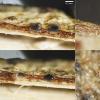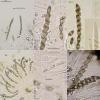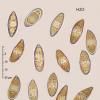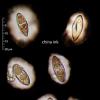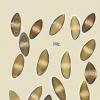
07-12-2015 14:17
 Zugna Marino
Zugna Marino
Buon giorno a tutti, ad un primo momento, non ess

29-01-2026 10:04
 Jean-Paul Priou
Jean-Paul Priou
Bonjour à tous, Marcel LECOMTE président de L'A

21-01-2026 16:32
Gernot FriebesHi,I need your help with some black dots on a lich

26-01-2026 11:49
Margot en Geert VullingsWe found this possible anamorph on a dead Cytisus

25-01-2026 23:23
Hello! I found this species that resembles Delitsc

18-01-2026 12:24
Hello.An anamorph located on the surface of a thin
Fungus on Euonymus japonicus
Enrique Rubio,
17-01-2025 12:36
This fungus was growing on dead terminal branches of Euonymus japonicus still attached to the bush. The gregarious perithecia are borne on the bark, not on the wood, inside very inconspicuous stromata, usually single or rarely in groups of two, with short necks with barely emerging ostioles. The asci are cylindrical and unitunicate, with a short stipe and a conspicuous subapical euamyloid ring, bluish in Melzer. The paraphyses are abundant and often contain refractive vacuoles. Its eight ellipsoidal ascospores are brownish at maturity, with high lipid content, some of them papillate and perhaps with an apical pore, with an adherent perispore that seems to disintegrate in the equatorial region of the ascospore where they may germinate. The pigmentation of the spore seems to be diluted in the equatorial region, forming a lighter band that is better seen in Melzer as it hides the guttules inside the spore. At this equatorial region of the spore, the walls become so weakened that the spore seem to be disintegrating. In Indian ink, a wide, irregular sheath can be seen surrounding the spore.
I don't have a precise idea about the genus to which this fungus might belong, but perhaps it could have some similarity with Fasciatispora or Amphisphaerella.
The truth is that I am very confused. Any ideas would be welcome.
Jacques Fournier,
17-01-2025 20:50

Re : Fungus on Euonymus japonicus
Hola Enrique, great find indeed!
I agree it fits well Fasciatispora, so far a tropical genus. References to known species are in Lu & Hyde 2000, monograph of Anthostomella.
I can scan and send you the relevant pages if you need.
Best,
Jacques
I agree it fits well Fasciatispora, so far a tropical genus. References to known species are in Lu & Hyde 2000, monograph of Anthostomella.
I can scan and send you the relevant pages if you need.
Best,
Jacques
Enrique Rubio,
17-01-2025 22:13
Re : Fungus on Euonymus japonicus
Thank you, Jacques. You always come to the rescue!
I have all those references you tell me about, but thank you for your generous offer.
With my best regards.
I have all those references you tell me about, but thank you for your generous offer.
With my best regards.


